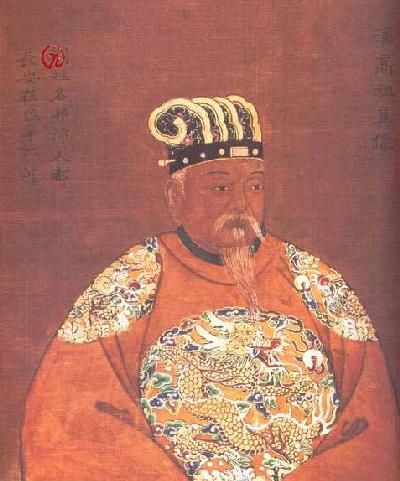| About China > History > Emperors > Famous Emperors |
|
|
Han Gaozu
In following years, Cheng Sheng, Wu Guang and Xiang Liang successively died in the fight, and Xiang Yu took over the armies in the north. Liu Bang moved his forces north and aligned himself with the Chu forces.
In 206BC, Liu Bang was the first to enter the capital city of Xian Yang and ended the rein of the Qin Dynasty. Liu Bang abandoned the harsh Qin laws, reduced taxes, and instituted three regulations to protect the common people; this made Liu Bang very popular with the people.
But because of his lack of soldiers, Liu Bang could not fight against Xiang Yu and was forced to withdraw his forces to Ba Shang, left behind his father and wife who were captured by Xiang Yu. After Xiang Yu proclaimed himself Prince of Western Chu (Xi Chu Ba Wang) and entitled eighteen warlords of Chu, he named Liu Bang Prince of Han (Han Wang).
Liu Bang was twice almost killed by Xiang Yu, and was able to flee both times only because Xiang Yu had not taken his consultant Fan Zeng's advice. One occasion was at the Hongmen Feast after Liu Bang first entered Xian Yang. At the Hongmen Feast, a trap was planned after Liu Bang had been forced to go to the Chu camps to make an apology. Fan Zeng and Xiang Yu had decided to kill Liu Bang during this meeting, and Fan Zeng signaled Xiang Yu to take action three times, but Xiang did not respond. As a result, Liu Bang fled. After the banquet, Fan Zeng was furious, saying, "This mean fellow (Xiang Yu) is not worthy of my service. It should be Peigong (Liu Bang) that defeats Xiang Yu and conquers the country."
During the Xian Yang Battle, Liu Bang's troops were besieged and ran out of ammunition and provisions, and as a stratagem to gain a respite, Liu sued for peace, to which Xiang Yu agreed, but Fan Zeng opposed strongly. At this time, Chen Ping, who was helping Liu Bang, used the stratagem of sowing distrust between Fan Zeng and Xiang Yu. As a result, Xiang Yu became suspicious of Fan Zeng and discharged him from his post, and Liu Bang thus avoided another disaster. Fan Zeng, at age 73, knowing that he was unable to save the situation, bid Xiang Yu farewell and left for his hometown, but died of disease on the way. After Fan Zeng's death, Xiang Yu had no more capable men left on his side, and a year later, the Chu came to an end.
When Liu Bang entered Ba Shang, he ordered his men to burn the Jian path to show that he would not return to Xian Yang. In Han Zhong, Liu Bang focused his efforts on developing new agricultural methods for the people and trained his troops. He accumulated vast wealth and used it to increase his military power. Also, he had Zhang Liang, Han Xin, and Xiao He as his most trusted strategists, helping form a plan of attack of Xiang Yu.
Within a year, Han Xin conquered four new territories and surrounded the remaining Chu army. In the year 202BC, Liu Bang signed a treaty with Xiang Yu. They agreed that the west would belong to the Han, and the east belongs to Chu. With this agreement, Xiang Yu lead his troops back to his camp, but Liu Bang's army then trapped Xiang Yu at He Xia. Xiang Yu finally committed suicide at Wu Jiang, and thus ended the four-year war between Chu and Han.
At the same year, Liu Bang established the Western Han Dynasty with its capital at Chang'an (formerly Xian Yang). He was the first commoner to become emperor in Chinese history.
After establishing the Han Empire, Liu Bang's fight for power continued. He fought numerous small wars against former allies: Han Xin, Chen Xi, and Peng Yue, in order to consolidate power in west China.
Another power that threatened Liu Bang's supremacy was a confederation of northern tribes lead by a Turkish speaking tribe called Hun. The Hun people were nomadic herders with supplementary agriculture and slaves. The Hun warriors had been making raids into China for a few years. Liu Bang knew that his military was not strong enough to defeat the northern tribes, so he bribed the Huns with food and clothing in exchanged for a peace treaty. He also sent a young woman, who he claimed was a princess, into marriage with a Hun prince.
In an effort to create a centralised management for his empire, Liu Bang needed an army of civil servants. Moreover, for reliable control of the empire, Liu Bang installed his brothers, uncles, and cousins as regional princes.
Liu Bang continued to support the warlords that were in his coalition against the Qin, and made them lesser nobles. Local Qin administrators who supported Liu Bang were left in place, and some friendly nobles were given back their lands.
Liu Bang ruled for less than a decade, and his main contributions were to consolidate the dynasty. He ruled by Confucian principles, changing the old system of legalism. Because he was the first emperor of Han, he was known as the High Emperor of Han (Han Gaozu). He learned the lesson from the cruelty of Qin, and set laws that reduced slavery and encouraged production. The Han Dynasty lasted for 400 years, and Liu Bang was named Han Gaozu. |
||||
 |
